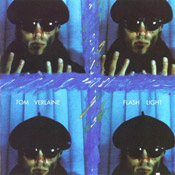
Cry Mercy Judge
Say A Prayer
A Town Called Walker
Song
The Scientist Writes A Letter
Bomb
4 A.M.
The Funniest Thing
Annie's Telling Me
One Time at Sundown
Fontana SFLP1 (UK), IRS (US), 1987
Tom Verlaine: Guitar and vocals
Jimmy Ripp: Guitar
Fred Smith: Bass
Allan Schwartzberg: Drums
Andy Newmark: Drums
Three years had passed since the release of "Cover", during which Verlaine lived in England, Portugal and France as well as the U.S., and some of the songs on "Flashlight were written here. In fact, when the album was first released it was only available in the U.S. on import. It was a pretty safe bet that we were going to get something different again from "Cover", and so it is.
"Flash Light" is the sound of poetry written with electric guitars. It sparks and rocks and thrills and it's the most tightly dynamic album Tom Verlaine has made since "Dreamtime".
On this album, his talent for creating exciting, tightly-sprung, angular rock songs is not only undiminished, but seems to have been even more refined. Listening to the first three songs one after the other you're struck by the fact that, not only does he seem to borrow nothing from any other guitarist, but his playing is free of all the baggage that just about all post-60s guitarists seem to carry around. There are no recycled blues riffs or structures, no obvious 60s rock'n'roll references. Wherever Tom Verlaine was coming from, he didn't get here via the Mississippi or the Mersey. In Jimmy Ripp, he seems to have found the perfect guitar foil to play against.
"Cry Mercy Judge" has a bass and drum punch that drives it along under frantic, dramatic guitars and a fractured vocal.
"Say A Prayer" is sharp and angular with what sounds like about six guitars all playing different things and never getting in each others' way.
"A Town Called Walker" is perhaps Verlaine at his best, dense with ringing guitars, rolling percussion and a lyric that draws you in, straining to work out what's going on.
"The Scientist Writes A Letter" is beautiful and Verlaine's best ballad/slow love song. The spoken and sung vocals manage to convey a sense of loss, distance and regret and the guitar solo says everything that the lyrics don't.
"Bomb" is spooky and edgy and "Annie's Telling Me" is tense and jittery, with guitar lines cutting across it like accents. Bizarrely enough, it's exactly how U2 might have sounded if they had had more taste and less bluster.
The vocals throughout are easy and confident, sometimes pleading, sometimes desperate, sometimes confiding or conversational. The way he sings "love is a savage thing... must have its way" in "One Times at Sundown" is a perfect Tom Verlaine moment. The characters that live in these songs show us little chunks of their lives and, like the best fiction, they seem to have a life before and after we meet them. What runs through all of these songs is a sense of passion, in the guitar playing, the vocals and lyrics and the very sense of what music itself should be about. What it should do and how it might make you feel. It reminds you why rock music can mean so much to you and just how exciting it can be.
...and some comments from Joe Thornton:
"I think Flash Light is best of all, especially because it has nine
masterpieces. Leave out the first track, Cry Mercy Judge, which doesn't cut
it for me. (A lot of people must have been put off by that song.) Everything
else on the album is immaculate. Each guitar solo a priceless gem. The
understanding with Jimmy Ripp is at an inspired peak, as good as any of the
Verlaine-Lloyd interplay.
Sundown is just so beautiful. Annie's Telling Me is so powerful, with the
greatest lyrics of all time. The Funniest Thing gives an almost-throwaway
impression, but it's gorgeous, and the guitar at the end that sounds like a
banjo is magic.
My favourite song of all is Song. It's incomparable. No one has ever done a
song like it, and no one would every try to cover it, surely? I feel that he
knew he had created something pretty much perfect (in the
two-guitars-bass-drums-voice four-minute love-song genre) and that's why he
called it Song. The depth of feeling in it is fantastic; the disarming
beginning, the uncanny guitar interplay, the weird rhythm, the build-up to a
sort of climax in the chorus, the guitars both powerful and restrained, his
voice more expressive than ever. So much affection there, a little pathos, a
trace of bitterness perhaps, a little self-deprecation and wry humour (these
difficult questions tell me a joke). But Real Love."
|